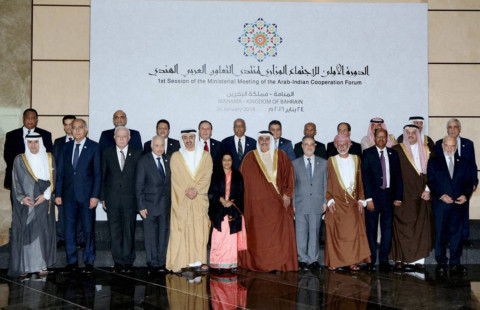
Manama: The first meeting between Arab foreign ministers and their Indian counterpart in the Bahraini capital Manama on Sunday has condemned the attacks on the Saudi embassy and general consulate in Iran.
The ministers said that the attacks “resulted in intrusions into the diplomatic and consular premises, causing serious damage,” and insisted that the Iranian authorities “bear full responsibility for not protecting the diplomatic premises as stipulated by the 1961 Vienna Convention on Diplomatic Relations and the 1963 Vienna Convention on Consular Relations.”
The minister in the Manama Declaration issued at the end of the meeting said they emphasised the importance that “cooperative relations between Arab States and the Islamic Republic of Iran be based on the principles of good neighbourliness, non-interference in internal affairs, respect of independence, sovereignty and territorial integrity, resolution of disputes through peaceful means, according to UN Charter and International Law, and refraining from use or threat of force.”
The Arab and Indian ministers “expressed their support to all peaceful efforts, including the efforts of the United Arab Emirates, to reach a peaceful solution to the issue of the Islands of Greater Tunb, Lesser Tunb and Abu Mousa with Iran through bilateral negotiations and in accordance with international law.”
The ministers said they had “deep concern regarding the situation in Syria” and affirmed the need to preserve the unity, sovereignty, territorial integrity and stability of the country.
They also highlighted “the importance to reach a political solution to the crisis that preserves the lives of Syrians and leads to cessation of hostilities and the establishment of a transitional governing body in accordance with the Geneva Communiqué of 30 June 2012, the Vienna Statements of October and November 2015 and the recently passed UN Security Council Resolution 2254 (2015).”
The two sides urged the international community and all governments and international bodies and organisations of the United Nations and its member states to provide support and assistance to Arab neighboring countries of Syria, Jordan, Iraq, Lebanon and Egypt, in addition to Sudan for hosting Syrian refugees.
They commended in this context, the role of Kuwait’s Emir Shaikh Sabah Al Ahmad Al Jaber Al Sabah for hosting the First, Second and Third International Donors’ Conference held in 2013, 2014 and 2015, and the participation of Kuwait in preparation for convening the Fourth Conference in 2016.
The Forum “affirmed their full commitment to safeguard the unity and territorial integrity of Yemen, and respect for its sovereignty and independence, to reject interference in its internal affairs, to stand by the Yemeni people and their aspirations for freedom, democracy and social justice.”
They reaffirmed the relevant Security Council Resolutions that particularly emphasized support of the legitimate Government in Yemen and condemned the unilateral procedures by the Houthi group as it undermines the transitional political process in Yemen.
The ministers called upon all Yemeni parties to settle disputes through dialogue and consultation and to facilitate humanitarian assistance operations, welcoming the establishment of “King Salman Centre for Charity and Humanitarian Relief”.
They affirmed the importance of implementing the Gulf Cooperation Council (GCC) initiative and its implementation mechanisms and the outcomes of the Comprehensive National Dialogue Conference.
The ministers said they welcomed the outcomes of Riyadh Conference held on May 17-19, upon the request of the Yemeni President Abd Rabbo Mansour Hadi, with the participation of all Yemeni parties, and asserted support for the United Nations efforts and the role of its Special Envoy to Yemen.
The two sides also expressed condemnation and resentment of the kidnapping of a number of Qataris in the South of Iraq, saying it constituted violation of their human rights. They also expressed full solidarity with Qatar and support for the measures it takes to secure their release amid hope that the communications carried out by Doha with Baghdad will yield positive results towards securing their safety and immediate end of their captivity.
The ministers also expressed concern with the kidnapping of 39 Indian workers in Mosul, Iraq, in June 2014 and three Indian workers in Sirte, Libya, in June. The Arab side expressed full solidarity with India in all efforts for their early release from captivity.












